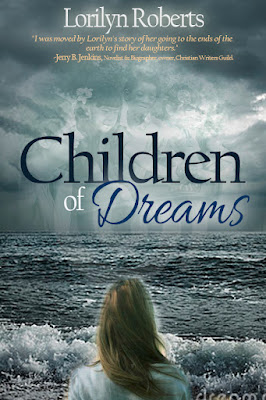As I continued to market Children of Dreams, make contacts, and converse with authors, I found I was not the only one walking this lonely road. There are many Christian writers out there with hopes, dreams and a passion for writing.
It is overwhelming to navigate the web and figure out where to spend money prudently to achieve the best results. There are boatloads of companies and individuals offering various packages. If you aren't discerning, you can quickly invest a lot of money in things that may give you exposure but not generate sales, and there is a difference. You can do a Google search of my name and easily pull up twenty pages. So, to be honest, I am no longer interested in exposure. I want to sell more books.
I tried many things to increase sales. I suspect many give up believing it’s too hard and too expensive. How many excellent books will never see the light of day? Even with lots of exposure, it's still tough to sell many books. Sometimes I think authors spend so much time writing and promoting their own books that it does not allow enough time for them to appreciate what others are writing. Finding the right balance can be elusive.
The idea of working hard to achieve your dreams resonates with my core beliefs that God rewards those who seek to glorify Him in whatever profession they pursue; and at the heart of glorifying God is hard work.
One of my favorite Bible verses is Colossians 3:23: “Whatever you do, work at it with all your heart, as working for the Lord, not for men.” You persevere, work hard to produce a product that others need or want, and eventually, if you are wise with the gifts God gives you, He will bless you.
With the downturn in the economy, it is increasingly difficult to market and sell books. The publishing industry across the board is hurting, but I believe the Christian market is suffering even more. The reality for Christian publishers is they must sell thousands of books to make a profit. If they don't succeed, they won't stay in business.
So when a mainline publishing company’s agent asks me, “How are you going to market your book?” I understand how important it is to assure him I can successfully market my book. Until recently, however, I was clueless about how I could do it effectively. So are many others, and that is something I hope to change.
Recently I listened to a well-known Christian author compare POD publishing to traditional publishing. He discouraged writers from going the POD route, claiming that a person who publishes a POD book is not really an author. I wanted to tell him that the way marketing is today, it's almost impossible for someone like me to get traditionally published—without a platform and a lot of money, neither of which I have.
I came away discouraged like I was a second-class author. It isn't enough to have a well-written book. The reality is, you could have a book as well written as Charles Dickenson’s Great Expectations and the world might never know about it.
I have read articles, blogs, excerpts, and books by unknown authors. There are some wonderful stories out there in cyberspace. That is not to say there isn’t mediocre writing also. But I want to help those Christian authors like me who have been inspired by God to achieve success. If God is all-powerful, and I don’t believe any Christian would deny that, He can get our books into the hands of those who will appreciate them and buy them. If anything, I think we tend to limit what God can do because our expectations are too low. We have an awesome God who is in the business of doing the impossible.
The other day I was on a Christian writers’ website. The blog mentioned how long it takes an unknown writer to get his book published by a mainline publisher—seven years. If I had dutifully followed the trail blazed by others before me, Children of Dreams wouldn't be out into the marketplace until I was sixty years old (ouch, that hurts).
I will compare that to my former husband’s educational experience. I put him through medical school which took four years. His residency following that took four more years. In eight years, he went from building bikes for minimum wage at Toys R Us to treating cancer patients making hundreds of thousands of dollars. If the medical system can accomplish that, surely there is something the Christian world can do to make that nine-year process go a little faster.
I am a single mother with two daughters. I’m employed full time as a closed captioner for television. I am taking online classes to earn my Masters in Creative Writing. I am the president of a local Christian writers critique group in Gainesville which meets once a month. I follow up with the attendees after the meetings to encourage them (we all need encouragement, even those who have “arrived”). I home school my youngest daughter who is eleven. We also have four neurotic cats and two wacky dogs.
Of course, the above activities don’t include the stressful job of living—paying bills, cooking, laundry, running my eleven-year-old daughter everywhere (she's a level eight competitive gymnast who spends twenty hours a week at the local gym), plus I am committed to a church, attend weekly, and am involved in a small, one-another group that meets once a week for prayer. I also try to swim laps every day at the Gainesville Health and Fitness Center (I want to be around for my grandkids). I am not complaining. God has blessed me with more than I could possibly do in my own strength.
My point is, in order to fit it all in, I must work hard, efficiently, and maintain an attitude that brings glory to God. Otherwise, I will receive the praise of man and not my heavenly Father. That's one reason I am reluctant to enter into book contests.
I believe Christian marketing is one of the most inefficient enterprises in existence. The way some of it is done now, I wonder if it’s working at all. Let me digress and make one more comparison, and then I will get on to my novel idea.
In February, I received an invitation from Steve Harrison to enroll in a class, “How to Make Your Book an Almost Instant Best Seller and Sell Tons of Copies—Even if You're a Marketing Novice.”
Steve Harrison is a guru in internet marketing. He occasionally will have a free webinar where he will have a guest on promoting some aspect of writing or marketing. I had attended a few in the past—I like free things, especially when I don’t have to go anywhere—and so I signed up for this one.
The guest on his show was Peggy McColl, an author who has had many bestsellers. I listened to the seminar and was intrigued. She explained how anyone can take any book and make it a bestseller on Barnes & Noble or Amazon by following a few prescribed things exactly. It didn’t have to be a new book. It could be an older book. It could be fiction. It could be nonfiction.
Most of my books have been sold on Amazon so this was attractive to me (I was never able to get Children of Dreams in bookstores even though I paid money to provide a restocking expense if any books were returned).
What impressed me most about her Bestseller Coaching Program, however, was she guaranteed success if you followed all the steps in her program. I had told myself (and God) I would no longer pay for any marketing programs unless they came with a guarantee—literally. This program came with a one hundred percent guarantee.
Enrolling in the Bestseller Coaching Program is not cheap. It cost me $2,500. I would have to sell a lot of books to recoup the money, but if I sold enough books to make Children of Dreams number one, that would make me a bestselling author on Amazon. I figured I would do whatever was required to make it work. If I failed, then I would get my money back.
I was in the middle of my screenwriting course in February, March, and April (I just turned in my last assignment a few days ago), so I knew it would have to wait a little while, but the guarantee ran for a year. That also sounded good, so I signed up for it.
There were many others participating in the Bestseller Coaching Program, and we had a group that agreed to be mentors to each other as we launched our books. I have received emails from some of them, and I asked since I had not started my campaign, “How is it going?” Everyone responded saying the hardest part was getting people to support their “campaign.”
Let me explain a little bit about how the Bestseller Coaching Program works. The idea behind it is you have a launch date, and you direct people to Amazon or Barnes & Noble to buy your book. You do this basically in two ways. First, you get Joint Venture Partners to promote your book through an email to their clients on the day of your book launch. The idea is to have everybody know about your book and buy it on the designated date. You add value to those buying your book by having partners that will be willing to offer bonus gifts during that 24-hour period.
The basic premise of the program resonated with what I knew worked.
My parents owned a small map company in Atlanta. Each summer they would solicit orders for the new Aero Atlas to be published in the fall. Customers could buy the book map at a discounted price until September when the price would increase, so it created a sense of urgency. If the customer wanted to receive his new map at the discounted rate, he had to buy it within the timeframe given.
Each client was contacted individually—the emphasis being on customer service. I spent several summers as a teenager working in the business, making phone calls, and encouraging each customer to buy at the lower price, ensuring he received his updated map, emphasizing how many new streets had been added. Surely he wanted to locate his customers efficiently without wasting precious time and gas. That would increase his profit margin.
Fast forward about thirty years. I provide closed captioning for television. One of the channels that I captioned until recently was QVC. QVC is the guru of home shopping and it has its own network. The Q stands for quality, the V stands for value, and the C stands for customer service. One of QVC’s most successful marketing strategies is the “Today’s Special Value.”
Sometimes it is jewelry. At other times it is clothing. Many times it is electronics—the newest gadgets in cameras, TVs, or computers; or maybe it is a kitchen product (yes, I bought a bunch of kitchen absurdities).
But besides presenting an excellent product (you must have that to start with; as a Christian, we shouldn’t accept anything less), there are several other factors that enable QVC to sell hundreds or thousands of a particular item in a short span of time.
First, there is a sense of urgency. The tagline could be something like, “You shouldn’t wait or it might sell out. Then you won’t be able to purchase it.”
Oftentimes it’s a version of something you can’t get anywhere else. Perhaps a new style purse, for example, that might be in an unusual or different color; maybe it is a two-for-one pineapple slicer. There are many variations on this concept.
Another example would be the Keurig coffee maker I bought. They added in extra K cups worth about $20 as well as some other online freebies (which I never bothered to get). But the extra K-cups were used and I felt like I received a lot of value for my money.
That is what we want to create when we sell something. We want the buyer to be convinced he has gotten a bargain. The only catch is he has to buy the product when we want him to buy it.
I would be amused when QVC had the cleaning experts on. They loved their mops and microfiber pads about as much as I loved my Bible; and passion sells. As authors, if we can’t be passionate about our words and willing to market our book with that much zest, then maybe we should find something else to do.
There were many occasions when QVC devoted a significant amount of time to something I could have cared less about—maybe the newest version of a popular screwdriver or wrench. Of course, I would rather be captioning baseball anyway, but by the end of the presentation, I would be embarrassed to admit how many times I was cajoled into buying something I never knew I needed.
While not everything in the above examples applies to selling a book, the concept does. I knew Peggy McColl’s Bestseller Coaching Program would work if enough Joint Venture Partners could be brought on board. I’ve had several conversations with authors who have launched their Bestseller Campaign and the one comment I’ve heard is it's very hard to get people to help you. Some don’t see the value. Others are busy and don't respond back.
I surmised this might be the weakest link in the marketing program. One author told me for every twenty people she contacted, she received one response. That means to convince two hundred people to partner with you on your book launch, you would need to contact four thousand people.
As I thought about this, I remembered a comment a Christian author recently made to me: Writing is done alone, but you can't get anywhere in this business as far as publishing without help from others. It's impossible.
God did not intend for us to be loner Christians. He wants us to be involved in a church and reach out to others as part of the Body of Christ. The Gospel of John tells us, as paraphrased in a song by Jars of Clay, “They will know we are Christians by our love.”

















